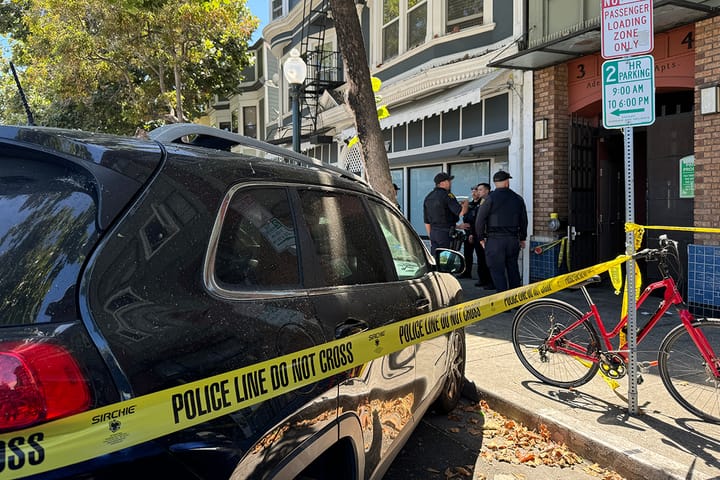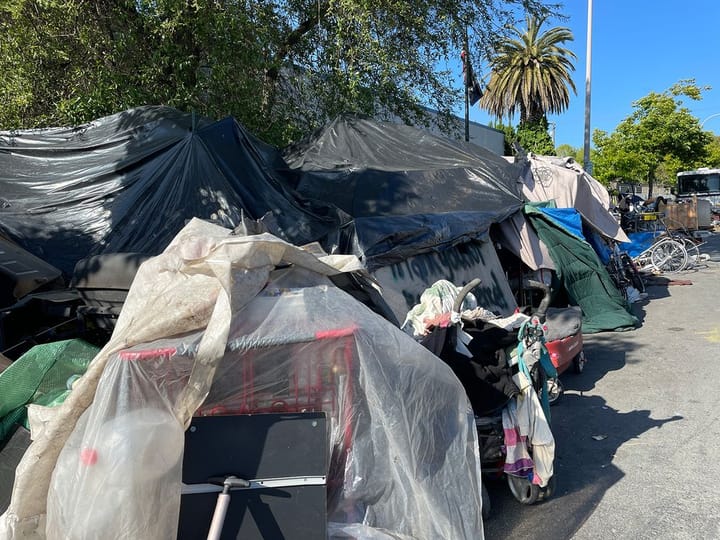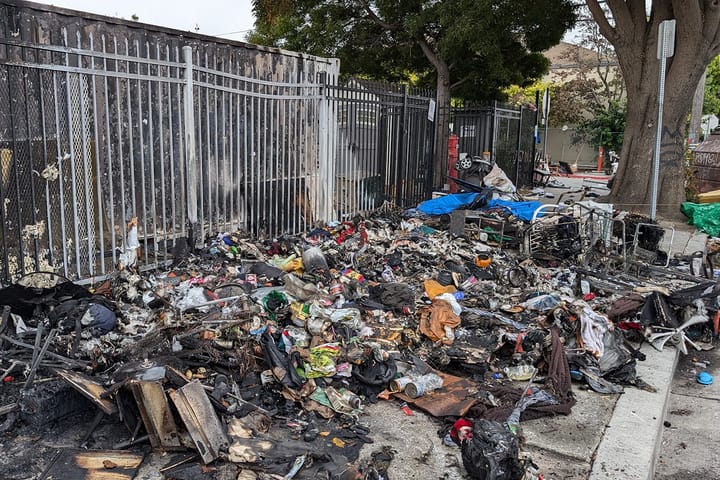Berkeley cop staged bike crash and lied about it, city found
The city argued that Corey Shedoudy's shifting stories about the day of the crash were "illogical and destroy his credibility."

Former Berkeley Police Officer Corey Shedoudy intentionally ran into a car while on bike patrol in 2020 and his subsequent termination was justified, an independent arbitrator has found.
On Thursday, the city of Berkeley released a 26-page report from arbitrator David Weinberg, which was completed earlier this month.
The Berkeley Scanner received the document through an ongoing Public Records Act request related to Shedoudy's termination.
Weinberg found that Shedoudy appeared to have planned his bike collision with a Toyota Camry by doing practice runs along the route and that he repeatedly lied about his location and duties on the day of the crash.
After the collision, Shedoudy sought workers' compensation benefits and planned to have surgery — although he canceled the procedure when he lost his benefits, according to the new report.
After the city fired him, Shedoudy fought to get his job back by filing a grievance to seek an independent review through the arbitration process.
In the end, Weinberg wrote, the evidence presented "made a convincing case that the Grievant intentionally crashed his bike into the Camry. For this type of conduct and associated policy violations, termination is not an unreasonable or excessive penalty. There was just cause for the termination of the Grievant and the grievance is denied."
Corey Shedoudy leaked alleged bike team texts to officials
In November 2022, The Berkeley Scanner was the first news outlet to report the circumstances of Shedoudy's termination, including his alleged misconduct.
The Scanner had been aware of Shedoudy's termination for months but he was still trying to get his job back through the grievance process, which meant no public records were available.
Out of concern for due process, The Scanner elected to wait to publish a story on Shedoudy until that process was complete.
In mid-November, however, while still involved in arbitration, Shedoudy emailed the Berkeley City Council to say he had been fired.
In the email, he made claims about "unethical and illegal" practices he said were prevalent in the bike unit to which he had been assigned.
Shedoudy claimed the bike team had "arrest quotas of downtown unhoused" and used "questionable legal tactics" such as "stop and frisk, probation searches with no reasonable suspicion of a crime, and a very loose interpretation of stay-away orders from UC Berkeley."
Multiple people familiar with the unit — which has received strong support from city officials and the business community — have said those claims are untrue.
Shedoudy's email also included alleged texts among bike team members, with a particular focus on Sgt. Darren Kacalek, who had run the unit and was the president of the Berkeley Police Association during part of the pandemic.
To complicate matters, Kacalek had been responsible for investigating the suspicious circumstances of Shedoudy's crash after others raised questions about it.
Multiple individuals leaked the Shedoudy email to the public and it quickly made headlines as the Berkeley Police Department's biggest scandal in more than a decade.
The texts, which included racist and anti-homeless comments, were decried by city leaders, the community and the police union.
Shedoudy held himself up as a whistleblower and numerous community activists did as well.
Kacalek stepped down from his role with the police union and was placed on paid administrative leave by the city pending the results of an investigation. (He is still on leave.)
The city hired an outside firm to investigate Shedoudy's claims and the Police Accountability Board launched its own review.
The outside firm's work is ongoing and therefore confidential. More details should be available once findings are made.
The Shedoudy allegations also delayed a vote in November to appoint a permanent Berkeley police chief.
That vote is now expected to take place in early May.
"Repeatedly riding the same route" for hours
The report released Thursday is the first new information to come to light about the Corey Shedoudy matter since the fall.
It is also the first official document that describes the misconduct that led the city to fire him.
In it, arbitrator Weinberg explained that his role had been to determine whether the city's decision to terminate Shedoudy had been justified.
In a disciplinary case, he wrote, the employer must prove it has "just cause" to end someone's employment.
According to the new document, the city had argued that Shedoudy made a false report by lying about the circumstances of his crash and that he filed a fraudulent insurance claim to get workers' compensation benefits.
The city's position had been that "termination is the only appropriate penalty for untruthful police officers," according to the new report. "Shedoudy not only was untruthful but also required an unnecessary use of emergency services and could have caused injuries to the public."
The city also wrote that Shedoudy offered contradictory accounts of the crash and that his "shifting explanation about that day is illogical and destroy his credibility."
After conducting his review, Weinberg said he determined that the city had, in fact, been able to show that Shedoudy intentionally crashed his bike on Bancroft Way at Ellsworth Street on Nov. 22, 2020, shortly before 5 p.m.
Surveillance footage showed him "repeatedly riding the same route as the accident" for more than two hours, Weinberg wrote.
"The evidence regarding him starting at a similar point, time and again, and riding through the intersection where the collision takes place is convincing evidence that there was planning involved," he wrote.
Sgt. Kacalek had documented 18 separate instances where Shedoudy rode through the intersection during that time, according to the arbitration report.
Corey Shedoudy ran into the Camry, city found
A subsequent internal affairs investigation by a different sergeant determined that Shedoudy had turned away from the Camry just prior to striking it, "then appeared to abruptly turn his handle bars to the left and in the direction of the vehicle."
After the crash, "Shedoudy appeared to methodically slide off of the hood on his stomach before he lowered his body on the ground," the IA sergeant found, unlike the "sudden and unexpected impacts [that] often cause a rag doll effect."
Some of Shedoudy's movements had been captured on body-worn camera (BWC) footage, according to the city: He had turned on his camera after hitting the ground but the devices, which are constantly recording, are programmed to include the 30 seconds prior to activation.
Weinberg said footage from the scene, both surveillance footage and body-camera video, indicated that Shedoudy had seen the Camry with enough time to stop had he wanted to do so.
There was also footage that showed Shedoudy looking at the Camry as it waited at a red light and then riding back to his "starting position on Bancroft" before making "a quick U-turn" and pedaling toward the car, the city found.
"He then stops pedaling and slows his bike down before hitting the vehicle with his front tire and landing on the hood of the car," the city argued. "The BWC video shows the Grievant feathering his brakes and steers his bike into the wrong lane to line up his bike with the car."
The fact that Shedoudy "moved into the left bike lane close before impact suggest intent to collide as he would have avoided the car if he had been further to the right lane, which is the more normal bike path route," the arbitrator wrote.
Shedoudy had reported being in other locations — not on Bancroft Way — in the hours before the crash, which Weinberg described as "strong circumstantial evidence that he was attempting to deceive the Department as to where he was and what he was up to."
Despite wearing a body camera, Weinberg also wrote, Shedoudy had not recorded any encounters or patrol work that substantiated his claims about what he had been doing that afternoon.
No findings on workers' comp fraud claims
Weinberg also wrote that he did not have enough information to make findings on the city's workers' compensation fraud allegations and was thus "making no determination … regarding their accuracy or truthfulness."
(The Berkeley Scanner has also sought information about those claims from the state and the Alameda County district attorney's office, which should have been advised of the allegations — but no one has been able to find any public records related to the claims or confirm their existence.)
Weinberg wrote that he had not relied on Kacalek's complaint about Shedoudy's misconduct because the sergeant had made some "findings which I believe he did not have sufficient evidence to prove as evidence of misconduct."
He described some of those conclusions as "too speculative to be given weight" and explained that he therefore had focused on "the source videos and other direct evidence" to make his final determination.
Shedoudy had argued that "Kacalek’s investigation should not be afforded any weight as he was biased and presumed from the start that the collision was staged."
But the city asserted that Shedoudy's "claims of bias against him by Sergeant Kacalek are unfounded and unsupported by any evidence."
Shedoudy had also alleged that he was an inexperienced bike rider who had not received adequate training and that he had been "mocked by his peers and Sergeant for his poor riding skills."
Weinberg dismissed those claims as lacking substance.
"He applied for the position on the bike team knowing he was going to be on a bike, and while he may not be an experienced and elite rider, it is hard to accept that someone with 7 children had not been riding a bike in the normal course of his life and was competent to do so," he wrote. "The video of him that day certainly did not indicate he was unable to effectively maneuver his bike."
On Thursday, The Berkeley Scanner reached out to Corey Shedoudy through his attorney who declined to comment at this time.
The Scanner expects to receive additional records and documents regarding the Shedoudy termination in the coming months.
The Scanner also broke the news in November that Shedoudy had filed his own civil case in Alameda County Superior Court against the Camry's driver, Fred Glass, who is a Berkeley resident and labor organizer.
According to court records, Shedoudy's lawsuit against Glass remains pending with a hearing set for May 23.




